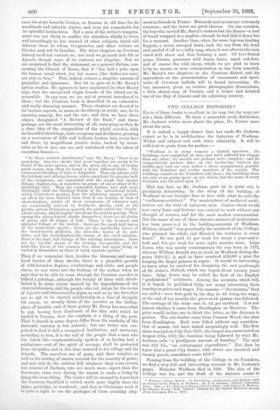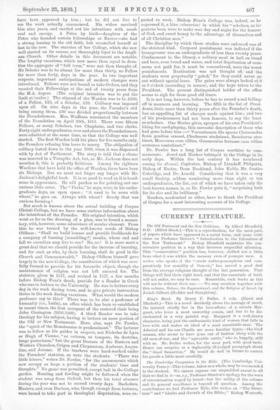TWO COLLEGE HISTORIES.* EACH of these books is excellent in
its way, but the ways are not a little different. To draw a somewhat crude distinction, Mr. Jackson writes more about the place, Dr. Fowler more about the men.
It is indeed a happy chance that has made Mr. Jackson, expert as he is in architecture, the historian of Wadham. Writer and subject suit each other admirably. It will be sufficient to quote from his preface :—
"Wadham is in many respects a typical specimen. its buildings were completed at once, and have suffered less change than any other ; its records are perhaps more complete ; and its comparatively modern date, on the border-line between the middle ages and our own, makes a closer acquaintance possible with the Founders and earlier members of the society. The buildings remain as the Foundress left them ; the buildings show not only every penny spent on the fabric, but the name of every workman who laboured upon it."
This last fact, as Mr. Jackson goes on to point out, is peculiarly interesting. In the story of the building of Wadham we are brought face to face with what he calls the "craftsman-architect." The masterpieces of media3val archi- tecture are the work of unknown men. Genius which would now carry fame and fortune was content to work without any thought of renown, and for the most .modest remuneration But the name of one of these obscure masters of architecture has been preset vcql. in the building-accounts of Wadham. William Arnold "was practically the architect of the College, who planned the whole, and directed the workmen in every detail," He was paid £1 per week for about a year-and-a- half, and 10s. per week for some eight months more. Inigo Jones, who was nearly contemporary (he was born in 1572, whereas William Arnold was at work on Wadhari during the years 1610-12), is said to have received £16,000 a year for keeping the Royal palaces in repair. It would be interesting to know what he received for designing the new quadrangle of St. John's, Oxford, which was begun about twenty years later. Inigo Jones may be called the first of the English " professional " architects. Among the accounts, which will, it is hoped, be published fully, are many interesting facts bearing on prices and wages. The masons—" freemasons," they are called—were first paid by the day, is. 4d. being the wage; at the end of ten months the piece-work system was followed. The carriage of the stone cost is. 4d. per cartioal It is not known whether it came from Headington or Shotover. The price would incline one to think the latter, as the distance is greater. The oak-timber came from Cumnor Wood; the elms from Headington. Both were felled without any considera- tion of season, but have lasted surprisingly well. The first stone was laid on July 31st, 1610; the chapel was consecrated on August 29th, 1612, the function being followed by what Mr. Jackson calls "a prodigious amount of feasting." The cost was 283 15s., "an extravagant expenditure." But does he know that a great City dinner, with about one hundred and twenty guests, sometimes costs £600?
Passing from the building of the College to its Pounders, we find a wry full and interesting account in Mr. Jackson's pages. Nicholas Wadham died in 1609. The idea of the College was his, and the draft of the statutes seems to * Walton College, oxford: its Foundation, Architecture, and History ; with. an Account of the Family of Wadham. By T. G. Jaokeon. Oxford: Clarendon Press. 1893.—The History of Corpus Christi College; with Lists of its Members. By Thomas Fowler, D.D. Oxford : Printed for the Oxford Hiatoritial Society at the Clarendon Pre s, 1898. have been approved by bin; but he did not live to see the work actually commenced. His widow survived him nine years, and carried out his intentions with much zeal and energy. A Petre by birth—daughter of the Petre who founded certain fellowships at Exeter—she had a strong leaning to the old faith, but reconciled herself at last to the new. The statutes of her College, which she saw well started on its course, are thoroughly loyal to the Angli- can Church. Other details in this document are notable.
The lengthy vacations, which now more than equal in dura- tion the aggregate of "full term," were not then thought of.
No Scholar was to be absent for more than thirty, no Fellow for more than forty, days in the year. In two important respects, important anticipations of modern changes were introduced. Fellows were not bound to take Orders, and they vacated their Fellowships at the end of twenty years from the M.A. degree. (The original intention was to put the limit at twelve.) The stipend of the Warden was to be £100, of a Fellow, 220, of a Scholar, £10, Celibacy was imposed upon all. On nine days in the year, the Founder's obit being among them, £30 was divided proportionally between the Fonndationers. Mrs. Wadham nominated the members of the Foundation on April 20th, 1613. There were fifteen Fellows, as many Scholars, two Chaplains, and two clerks.
Forty-eight undergraduates, over and above the Foundationers, were admitted at the same time, so that the College was well started. The first Warden held his place for five months only, the Founders refusing him leave to marry. The obligation of celibacy lasted down to the year 1806, when it was dispensed with by Act of Parliament. The story is told that a clause was inserted in a Turnpike Act, but, as Mr. Jackson does not mention it, this is probably fictitious. Among the eighteen Wardens that have held the office of Warden, there have been six Bishops. But we must not linger any longer with Mr. Jackson's delightful book. It is as good to read as it is hand- some in appearance. He will pardon us for pointing out one curious little error. The "Parks," he says, were, in his under- graduate days, an open space ; "it used to be sown with wheat," he goes on. Always with wheat ? Surely that was curious farming !
Not much is known about the actual building of Corpus Christi College, but we have some curious information about the intentions of the Founder. His original intention, which went as far as the drawing of a plan, was to found a monas- tery, with, however, some admixture of secular element. From this he was turned by the well-known words of Bishop Oldham : "Shall we build houses and provide livelihoods for a company of bussing [mumbling P] monks, whose end and fall we ourselves may live to see ? No, no I It is more meet a great deal that we should provide for the increase of learning, and for such as who, by their learning, shall do good in the Church and Commonwealth." Bishop Oldham himself gave largely to the new College, the constitution of which was care- fully framed to provide for his favourite object, though the maintenance of religion was not left 'named for. The statutes, given in 1517, and revised in 1527, a few months before Bishop Foxe's death, provide for a Reader in Greek who was to lecture to the University. He was to lecture every day in the week during term, and to give private instruction thrice in the week during vacations. What would the modern professor say to this ? There was to be also a professor of humanity (i.e. Latin), an office which has been re-established in recent times, the first occupant of the restored chair being John Conington (1856-1869). A third Reader was to take theology for his subject, having to lecture on some portion of the Old or New Testament. Here, also, says Dr. Fowler, the "spirit of the Renaissance is predominant." The lecturer was to follow as his guides in exegesis, not Nicholas de Lyra or Hugh of Vienne, "ac aeteros, ut tempore, ita doctrine, longe posteriores," but the great Doctors of the Eastern and Western Churches, Origen and Chrysostom, Ambrose, Augus- tine, and Jerome. If the teachers were hard-worked under the Founders' statutes, so were the students. "There was little leisure," writes Dr. Fowler, "for the amusements which now occupy so large a portion of the students' time and thoughts." No game was permitted, except ball in the College garden. Hunting and fowling might be followed when the student was away from Oxford, but then his total absence during the year was not to exceed twenty days. Bachelors, Masters, and even Doctors, who, though exempt from lectures, were bound to take part in theological disputation, were ex. pected to work. Bishop Foxe's College was, indeed, as he expressed it, a hive (alveariva) in which his "scholars, as ire' genious bees, were to make wax day and night for the honour of God, and sweet honey to the advantage of themselves and of all Christian men."
The discipline by which these studies were enforced was of the strictest kind. Corporal punishment was inflicted if the transgressor was an undergraduate of less than twenty years. Confinement to the library, a solitary meal in hall on bread and beer, even bread and water, and total deprivation of com- mons not paid for, it must be remembered, were the worst punishments. Rustication was not thought of, and the students were perpetually "gated," for they could never go out without special leave. The gates were always locked at 8 or 9 o'clock (according to season), and the keys taken to the President. The present distinguished holder of the office seems to sigh for these good old times.
It is not long, however, before he has to record a sad falling- off in manners and learning. The fifth in the list of Presi- dents, little more than thirty years after the Founder's death, has an appalling list of charges made against him ; and two of his predecessors had not been famous, to say the least as scholars. One Morice gives, apropos of his own President's liking for card-playing, this sarcastic description of those who had gone before him :—" Verumtamen illo spacio Claimundus flexis genibus orasset, Chedsaeus studnisset, Boucherus ster- tisset, Mouvenus cum villico, Greenevains fortasse cum villica sermones contulisset."
Dr. Fowler has a long list of Corpus worthies to com- memorate. Jewel and Hooker belonged to the College in its early days. Within the last century it has numbered among its alumni, Copleston, Bishop of Llandaff, Philpotts, Bishop of Exeter, Dean Buckland, John Keble, Mr. Justice Coleridge, and Dr. Arnold. Considering that it was a very small Society, seldom numbering more than eight or ten undergraduates, the list, out of which we have taken only the best-known names, is, as Dr. Fowler puts it, "surprising both for its size and its brilliancy."
Readers, academical or other, have to thank the President of Corpus for a most interesting account of his College.



































 Previous page
Previous page